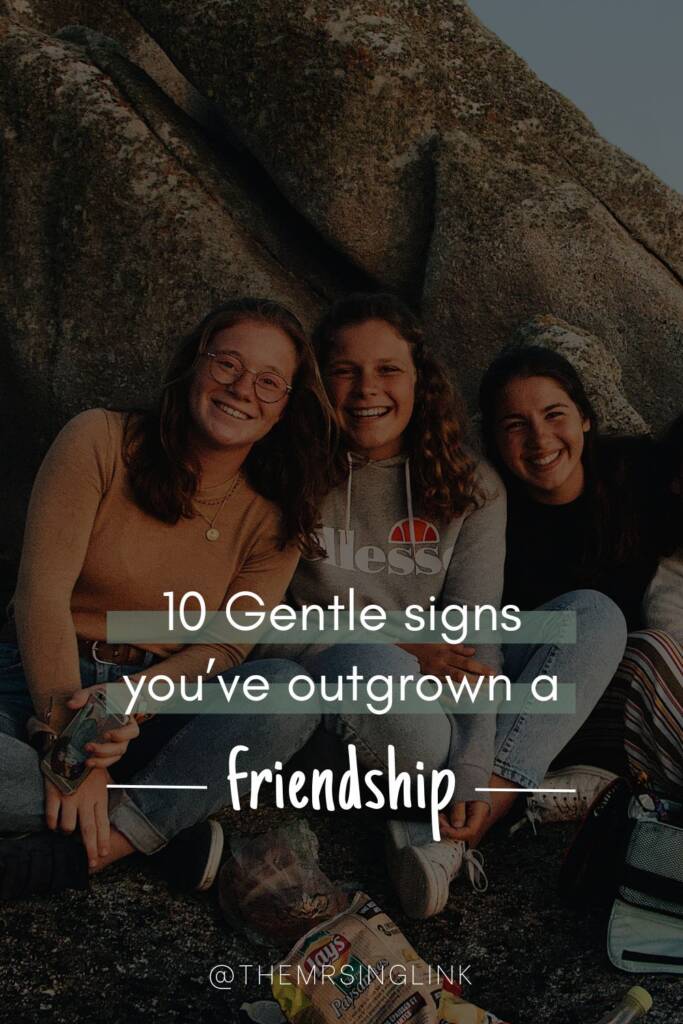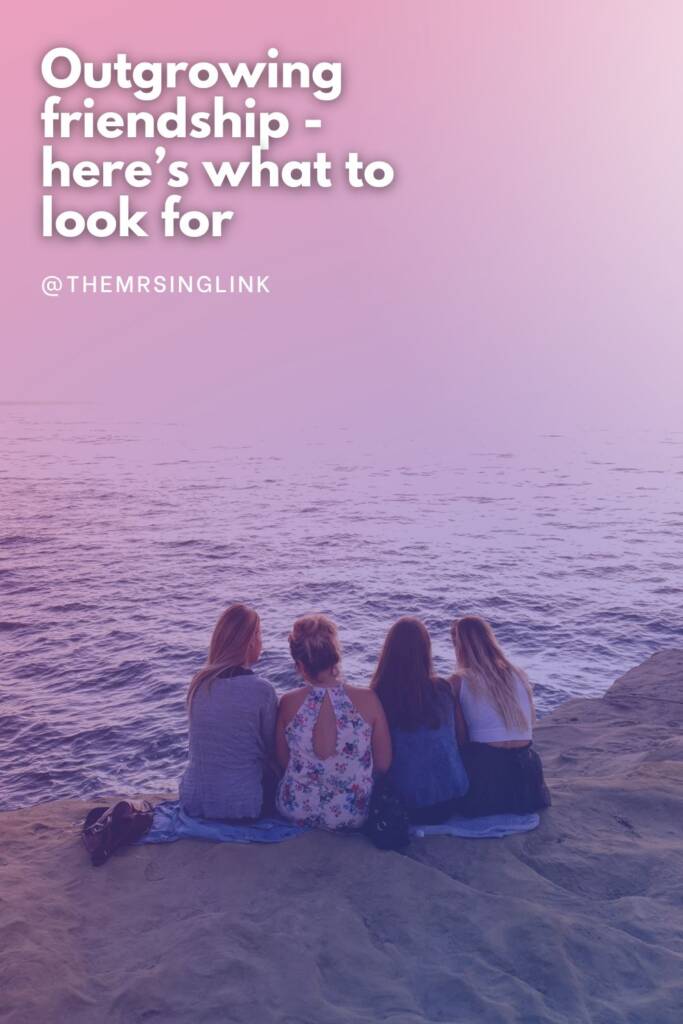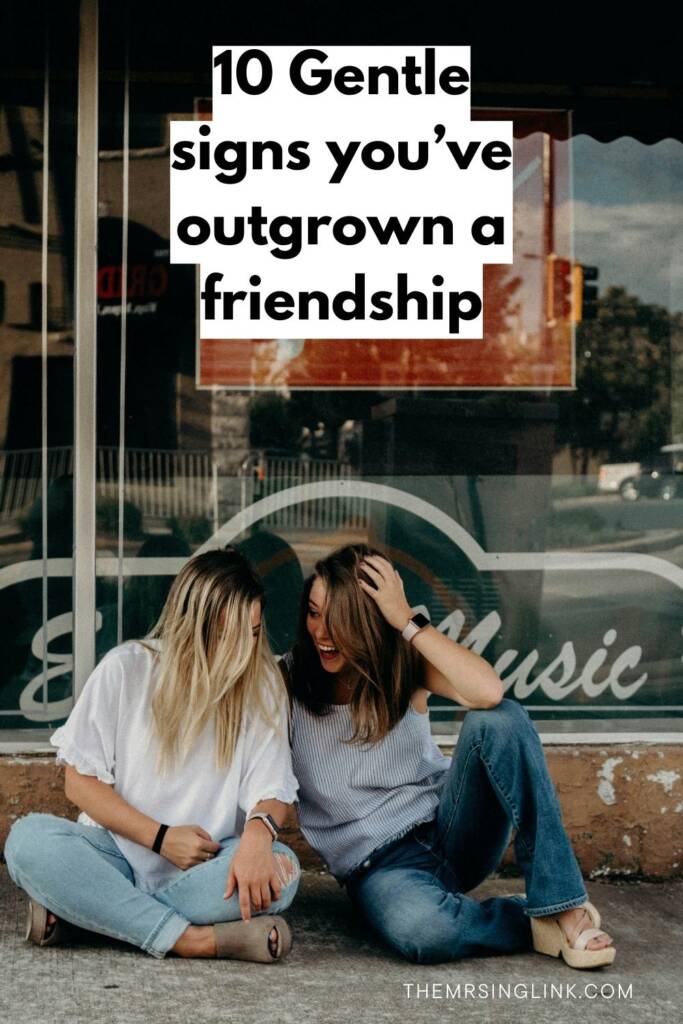Why gentle? Well, because not all friendships end chaotically, out of strife or neglect. In fact, I would argue that many friendships outgrow themselves prior to ending in conflict. This fact was definitely inspiration for my post on why I stopped forcing friendships in my life.
What usually ends in discord and animosity is a friendship that probably already endured the gentle signs of outgrowing itself. Sometimes this can look or feel like confusion, discomfort and discernment. We must also recognize that there will be friendships where the other person outgrows ourselves – we can accept this with grace.
Even so, a friendship you’ve outgrown doesn’t always or necessarily have to mean you stop being friends altogether – this is an individual determination.
A gentle overview of this post
10 Gentle signs you’ve outgrown a friendship
That being said, sometimes these gentle signs go into the glossed over pile. In some cases this is okay – friendships can be repairable as well as experience life’s natural ebb and flow (of change, growth and seasons), let’s not forget. We used to label this as friendships that drifted apart, and maybe we still do, but drifting apart means a separation or stunt in growth. Like I said, this doesn’t always equate to the end of a friendship.
In this post, however, I’m leaning on the friendships that may be better off going their separate ways…preferably before ending in chaos, strife or neglect. Honestly, once you’re tuned into the signs that you’ve outgrown a friendship, they’re pretty hard to un-see. You might surprise yourself with how many there actually are.
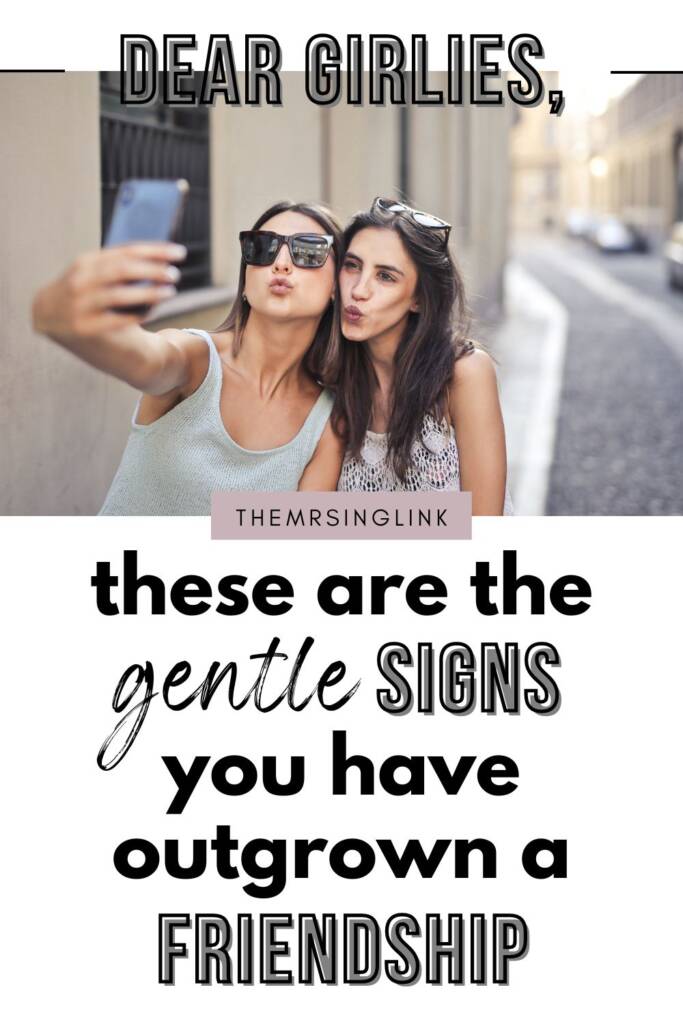
**Before you read, please note that ALL of these points are also vice versa!
You hardly talk “just because”
You know, talking without reason or cause, or just to check-in – mainly because you want to. But when the initiation for emotional connection is slim to none, this does technically mean the desire to is less or lost.
You stop or no longer want to reach out to see how they’re doing, what they’ve been up to, or to establish that feeling of connection – even if that’s simply sending them a relatable video or funny meme. Instead, when/if you do call or text, it’s more business as usual – what this means for you is something you will have to discern individually.
They cross your mind less
This does refer to the above point, because to reach out “just because” requires you to think of them, at least from time to time. But life is never that simple, we know it can get chaotic, all-consuming and complicated. So if they hardly, rarely, or never cross your mind (say, unless it’s thrown smack in your face – like seeing their social media post) then actions, or lack thereof, are typically to follow.
You’re less likely to remember important events, such as their birthday (guilty, here), inquire about the menial, little things, such as when they’re sick or the job interview they told you about (things that are important to them).
To be blunt, when you’ve outgrown a friendship it really can come off seeming like you don’t care.
[Related Read: 5 Red flags you’re in a one-sided friendship]
They’re not as high of a priority
Listen, this doesn’t necessarily mean we Love someone less…it just means that other priorities take precedence, including others. Being an adult with more individual responsibilities, obligations, life-altering decisions, inconveniences, objectives, and freedoms means organization and balance are not only required but critical. We’re not told enough in life that we won’t always have it all or our way, so we have to prioritize what’s most important (to us).
Today, we often hear the opposite – we can’t take no as an answer in life…especially when it comes from life. So I imagine our totem of priorities being like the stock market – growing, compiling, dipping, tanking, exploding and rearranging every second of every day.
Anywho, the people in our life also fall on a spectrum of priority – sorry, but it’s true. Your parents are probably more important than your co-workers, and your co-workers are probably more important than your neighbor – just as an example. Again, it doesn’t mean we Love some more and others less. So when a friend rarely, or no longer, precedes certain things or others on this spectrum in your life it is time to start questioning the validity of that friendship according to our personal expectations.
How can we expect something of someone we’re not willing to reciprocate?
The main thing to be asking yourself is, “Do you want them to be a higher priority in your life?“, and start from there. Sometimes it is difficult to prioritize certain friendships higher than they are, and this is totally okay, but that means we also have to be willing to accept that it won’t always result in what we expect or hope. Meaning, your friend may prioritize you less, or more, and ultimately cease friendship when efforts are not mutual.
Reciprocation is barren
Or heavily one-sided. These kinds of connections suck, yes. Though we must understand our relationships with others are not always going to be 50/50. 100/100 doesn’t work either because that’s expecting perfection from both individuals, which is unrealistic and unattainable. Giving your best looks different per individual at different times as well.
Reciprocity is barren when there’s no desire to connect as well as no desire to receive a connection. This can be as simple as not responding to each other’s calls or texts for weeks or months on end, especially when there is no mutual understanding and acceptance. Both sting because it’s rejection to the fullest extent. And this is something we’ve ALL likely experienced from both sides.
When you’re not interested in hanging out with someone, you usually decline, right? Are we good about initiating a raincheck date when we decline, or does the conversation typically end there? In saying that, are we fully honest when we decline because it’s that we don’t actually want to see them altogether? Probably not. We figure they’ll just get the hint eventually. The same also applies to responding to texts and missed phone calls.
In deeply-rooted friendships, a lack of reciprocation becomes so, so painful, especially when it’s ongoing, repetitive or a consistent cycle. Rejection hurts worse when it comes from those we share a connection with and care about, and vice versa. Though oftentimes we fail to notice the impact it has or can have when we’re the ones doing more of the rejecting – it’s like we almost become desensitized to doing it.
The thing is, and it’s not said enough, if rejecting or being rejected becomes *easier* is when you can really find the answer as to whether you’ve outgrown a friendship.
[Related Read: Your coworkers are NOT your friends first]
Getting together feels like a chore
We all know what a chore feels like. Maybe you dread it (for personal reasons). Maybe when you realize you haven’t seen each other in weeks or months, it gives you this icky, guilty feeling rather than anticipation…because, frankly, deep down you’ve been fine putting it off.
If making plans to get together feels like checking off part of your social To-Do list or doing your due diligence, what’s a friendship in that?
Granted, as someone who’s fairly over-analytical, there is a bit of understanding to that mentality there. For me, it feels good to “check things off” because it helps my brain to compute that I’m prioritizing certain goals as well as taking care of myself and other connections in my life. Though there have been certain friendships where getting together primarily operated out of appeasement, as to avoid the risk of sabotaging that friendship.
When it feels like an obligation is when it becomes a burden on your life. And I think many of us can attest to having friendships that felt more like a job than a relief.
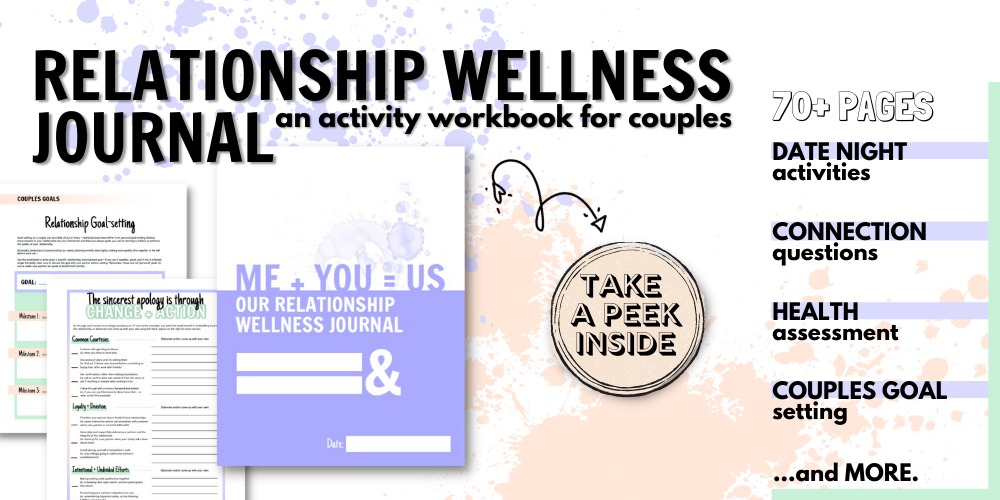
You feel worse after spending time together
This is huge. I think people tend to put off what this means because friendships are not based on a feeling. CORRECT, however, a friendship is no friendship at all when it leaves you depleted, or feeling *stuck*. As if you have been drained of your energy, peace, confidence, growth, stability, purpose, or esteem.
Have you ever hung out with someone (or began noticing when hanging out with a friend) that ultimately makes you feel worse (i.e., about yourself or them)? Do you anticipate your time together being over? Do you get this feeling of exhaustion from being around them, as if you’ve been walking on eggshells?
As I got older, I understood what this meant more simply because all those things [my peace, energy, confidence, stability, purpose, growth, esteem, etc.] often felt compromised. I sacrificed a lot of those things as in order to be accepted, included or to fit in. So to many people these are simply the things you subliminally compromise in the name of Friendship.
There were also times I felt stuck around certain individuals, like as if I had to be the same person they knew me to be in order for our friendship to work. I couldn’t embrace personal growth, so to speak, and sometimes it felt like I was being dragged down (with them) from climbing up the ladder.
So you may notice that when you prioritize those things (peace, growth, purpose, esteem, energy, etc.)…you will have fewer and fewer real, long-term friends. But why do we limit ourselves of only choosing between the lesser of two evils?
You’ve lost whatever it was that brought you together
Like relationships, many typically begin with that *spark* – that thing that drew you close or ignited compatibility. Granted, you should never rely on the spark to keep you together but maybe we ought to think of this spark as relatability. As human beings we’re wired for connection, and we feel most connected with individuals we relate with. Not necessarily interests or hobbies, particularly (we’ll get there), but think more individual circumstances or our core.
My childhood best friend lived across the street from me, so naturally our parents brought us together for play dates. You could say essentially this friendship was rather forced. I wouldn’t say this is untrue, but I do think we (I) grew to Love one another as friends through our differences because we really were opposite in many ways. And then that friend ended up moving away and we rekindled many years later, but ultimately our friendship ceased permanently…from an unrelated happenstance, actually.
With that, many people are brought together in this way, such as through school, a job, club, social circle, church, etc. But these things aren’t guaranteed to be what keeps you together. I can recall a time in high school, especially, when I related to girls who were more like me – Tom-boyish, had nerdy quirks, we’re unapologetically silly and funny, liked getting out in nature, were deep, creative thinkers and the more artsy fartsy type.
[Related Read: Adult friendships are difficult these days, and never seem to last]
Adolescence aside, we still look to and are drawn more to people who are relatable to ourselves and especially our [current] circumstances. For instance, you may have befriended someone during the time your parents went through a nasty divorce because they experienced the same thing. This is why we form groups, join clubs, and share that sense of belonging when we find and bond with people like ourselves.
When you’ve outgrown a friendship, you’ve either lost that sense or no longer relate. Maybe you have evolved, your compatibility with that person has changed and now you look to something else to bring you together (that may not exist). You shared a bond with that friend through your parents’ divorce; years later you have forgiven your parents, have a healthy understanding and respect for their decisions and are now happily married while your friend continues to hold onto – as well as project – bitter resentment toward their parents and the idea of marriage altogether.
At the end of the day, you no longer relate based on your [current] circumstances. Does this necessarily mean a friendship is doomed? No, but it’s a different story when growth and health in friendship are inhibited or compromised. We forget that people, in general, either evolve or are stuck in their ways. We become fixated on holding onto something (a friendship) from 10 years ago, expecting it to be unwavering, and thus feel abandoned and disheartened when friendship loyalty doesn’t survive the changes.
You struggle to respect your personal boundaries or limitations, and theirs
I’ll make this point fairly simple – let’s use the example of drinking (alcohol). *I highly encourage you to evaluate and understand other examples surrounding this point, those pertaining to diet, religion, finances, trauma, and personal lifestyle just to name a few.
Let’s say you don’t drink, no longer do or are taking strides to limit or stop drinking alcohol. Yet this friend continues to plan activities that involve drinking. In one breath, this may not seem like a big deal because you are responsible for you and your friend is responsible for themselves. In another, it can grow tiring to constantly bend your limitations in order to appease that friend.
Because of this, you either push through the exhaustion or decline more outings in order to uphold your personal boundaries, limitations or lifestyle. The bigger picture here is this: in order for this friendship to work there will need to be time together dedicated apart from the presence of alcohol. And if you and your friend aren’t willing to respect and honor that then it is a telltale sign a friendship has parted ways.
Again, there are so many examples of this scenario, but it’s safe to say that blurred lines, violated boundaries, pressed limitations, and unintended, casual disrespect are fairly common in the line of potentially unhealthy friendships.
You no longer share similar interests and values
Unfortunately, this is the most common, and rightfully so because much of our lives is surrounded by individual appeals, personal fulfillment, appearances, desires, morality (subjective and objective), beliefs, etc.. And with the constancy of new information all the time, it’s hard to keep up with and enjoy what’s current. At least not for very long before it becomes a fart in the wind. Think *trends* or controversial *narratives*.
You have to admit, our interests change on a dime now more than ever, especially with technology at the forefront. Let’s be real, here. Last week I was obsessed with crocheting, and this week I’m nose-deep in sourdough starter making.
Granted, yes, our lifestyles can and do go through changes – some much needed, and healthy. A few years ago I was in the Girl Boss hustle headspace, and now I’m happier than ever embracing more of the slow living, minimalist, soft feminine era. With that, I relate more with those of a similar mindset and lifestyle at this point in my life. You also might find yourself doing the same.
As for our values, what we value, including our beliefs and our belief system, we’re told to be *open-minded* yet hold firm. Personally, I don’t think we fully know what that means. The point is, we tend to elevate what friendship offers or brings [adds] to our life than the actual person for who they are. Therefore, one way you can understand what it means to have outgrown a friendship is when you no longer value the person and solely depend on the entity of that friendship for what it can provide you.
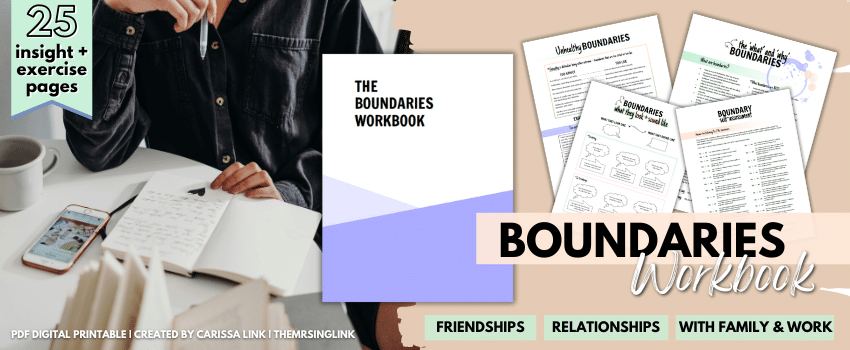
You’re no longer supportive or have reached too many “dead ends”
I saved this one for last because it cuts pretty deep. I will talk about what I mean by “dead ends”, but first let’s talk about what it means to support or be supportive in friendship. To support something is to encourage, celebrate or condone something, right? To support someone (in or through something) is to help them along or walk beside them in or through something, such as a serious illness or loss in the family.
But are we to support someone’s free will to make their own decisions AND to support the decision from their free will (based on the above definition)? That is the bigger question.
We’re often told being supportive of others (particularly those we Love and care about) is the pinnacle to healthy relationships, because we’ve defined support as being unconditional and rather involuntary. That to support a friend is to share in their burdens as well as to walk alongside them, as their cheerleader, in who they are and everything they do. Fair to say? So when you’re no longer supportive in a friendship, it will simply come off as doing the very opposite altogether.
Okay, BUT, is everything in this life beneficial or *good* to support? For instance, if your friend drinks a lot – to the point of belligerency or causing trouble – are you to be supportive simply because that friend loves to drink and have a good time regardless of the consequences?
To what point is support no longer helpful or loving? This is what I call a dead end.
What about being supportive when it pertains to the very things, individually, we do not support? *I highly encourage you to evaluate and understand other examples surrounding this point.
For instance, your friend isn’t happy in their relationship…so they cheat. Your friend is expecting or wanting your support for their decision to cheat because of the unhappiness in their relationship, so are you to compromise your belief in that cheating is wrong for the sake of supporting your friend? Again, is it actually supportive or is it hurtful to condone something that is wrong (even if they believe otherwise)?
This is also a dead end.
When you’ve outgrown a friendship is when you start to accumulate more of these dead ends (of involuntary support) that ultimately force you to compromise your morals and values as well as jeopardize your foundation in truth.
